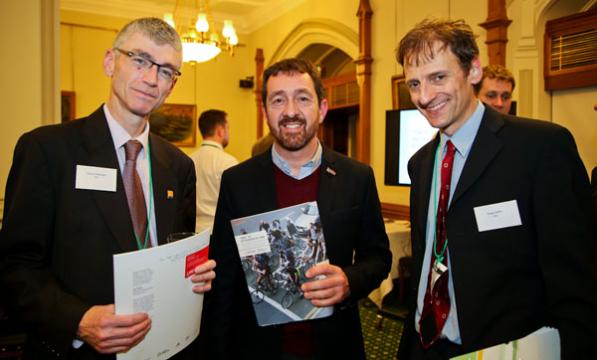CTC urges MPs to demand action and funding to ‘Get Britain Cycling’

The inquiry was called following a horrific spate of 6 cyclists’ deaths in London within 13 days last November.
After submitting written evidence (see below), CTC was called by the committee to present oral evidence alongside British Cycling's spokeman Chris Boardman and AA President Edmund King.
In response to the Prime Minister's call last summer for a 'cycling revolution', CTC reiterated its call for top level leadership, made by CTC President Jon Snow during the Select Committee’s original road safety inquiry in April 2012 (further background here).
Speaking prior to representing CTC at the inquiry, Campaigns & Policy Director Roger Geffen said:
"Words are not enough to ‘Get Britain Cycling’. We need leadership, commitment to consistently high cycle-friendly design standards, and long-term funding of at least £10 per head annually to achieve these.
“The risks of cycling are lower than most people imagine – yet they are deterred from cycling in Britain due to fear. You are less likely to be killed in a mile of cycling than a mile of walking. If we are to maximise cycling’s health and other benefits, we must enable people to cycle in conditions that are as inviting as they are in countries like Denmark and the Netherlands. Britain now has 40 years of catching up to do; it is time for action.”
Words are not enough to ‘Get Britain Cycling’. We need leadership, commitment to consistently high cycle-friendly design standards, and consistent funding of at least £10 per head annually to achieve these.
Roger Geffen
CTC Campaigns Director
What CTC is calling for
In addition to leadership, political commitment and funding, CTC’s evidence also calls for:
• Targets which encourage more as well as safer cycling.
• Lower speed limits. 20mph speed limits should become the norm for urban streets, with highway authorities having the freedom to identify appropriate exceptions. Zones of 40mph or lower limits should be widely introduced for rural lane networks.
• Cycle-friendly design standards that allow cyclists of all ages and abilities to use roads and streets safely and comfortably, with particular attention paid to cyclists’ safety and priority at junctions where 75% of cyclists’ collision injuries occur.
• Training and awareness campaigns to promote safety awareness among drivers and cyclists alike, with ‘Bikeability’ cycle training available for people of all ages.
• Strengthened road traffic law and enforcement, with roads policing being given greater priority. Driving which causes obvious ‘danger’ should never be dismissed as merely ‘careless’ driving offences.
• Improved lorry safety, through collaboration between the government, EU and industry, to deliver mandatory cycle awareness training, safer lorry designs and equipment and fewer lorries on busy streets.
Choose Cycling
CTC's demands correspond with similar calls made by British Cycling in their 'Time to Choose Cycling' manifesto, which was launched today. Both organisations worked to support the All Party Parliamentary Cycling Group's Get Britain Cycling inquiry in 2013.
Speaking at the launch of 'Time to Choose Cycling', before giving evidence to the Select Committee inquiry, Chris Boardman explained the 10 points of the manifesto, including the need to 'cycle-proof' all highway and planning decisions, backed by spending of at least £10 per person annually on cycling.
Oral evidence
During the Commons evidence session, Roger Geffen stressed the need for the Prime Minister to provide explicit backing for the Government's cross-departmental Cycling Delivery Plan, to ensure that all relevant Government departments and other bodies are signed up to it. He urged the adoption of targets or indicators which measure progress on improving both actual and perceived road safety. He added that the measurement of actual road safety should reflect changes in the levels of cycle use as well as the numbers of cyclist casualties. That way, Councils and others are incentivised to aim for more, as well as safer, cycling - as called for in CTC's Safety in Numbers campaign.
He deplored the poor standards of cycle infrastructure currently built in the UK, and argued that on major roads dedicated 'Space for Cycling' was needed, but must be designed with adequate widths and careful design of junction. When asked how the Dutch reached the levels of cycling they achieved, he explained that this was led by a massive increase in high quality cycle infrastructure, backed up by supportive measures.
Geffen also explained the aims of CTC's Road Justice campaign. These include: more priority and resources for roads policing (not only as a deterrent to bad driving, but also to improve the standards of crash investigations and the treatment of road-crash victims); prosecuting those who have caused obviously foreseeable danger with 'dangerous' (and not merely 'careless') driving offences; and making greater use of long driving bans as a sentencing option.
Councils call for more funding
After CTC, British Cycling and the AAs' session, representatives from local authorities gave evidence. Councillor Ian Davey, who leads on transport at Brighton & Hove Council, argued for dedicated funding for cycling from central government. Two councillors from Surrey agreed with the need to support cycling with dedicated funding, but argued for regulation of 'sportive' cycling events, which bring thousands of cyclists to Surrey's roads on summer weekends.
You can watch the evidence session in full here.

